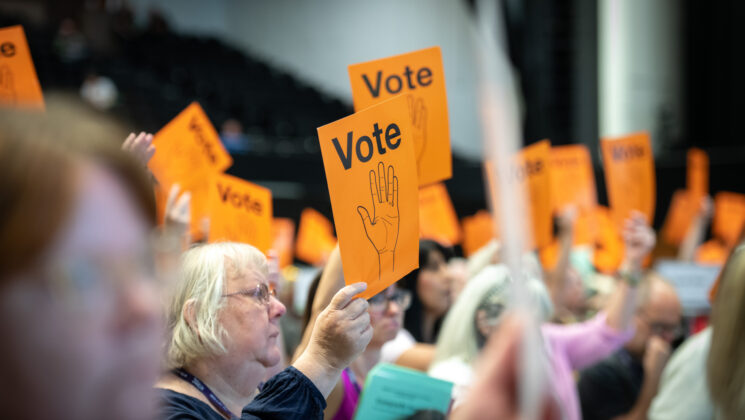Chaired by UNISON vice president Andrea Egan, the first afternoon of this year’s local government conference saw the union pass a three-part composite motion on climate change in local government, alongside one on ending misogyny.
Climate change
Councils are key to meeting climate change emission targets: they are directly responsible for between 2% and 5% of their local area’s emissions and play a significant role in emissions reduction due to their powers over housing, planning, transport, waste and other issues.
91% of councils have adopted at least one net-zero commitment, and 38% of single and upper tier authorities have declared intentions to decarbonise their local area by or before 2030.
As one speaker said: “pledges without implementation plans are absolutely worthless.”
Last year, UNISON research uncovered a budget shortfall for councils in England, Scotland and wales of £3 billion. This will jeopardise climate targets. Councils need upfront investment and additional operational budgets.
UNISON members called for local councils to retrofit buildings with better insulation, invest in public transport infrastructure, and enhance waste collection and processing. Representing Cymru/Wales local government committee, Kim Russell said such measures would tackle both the cost of living crisis and climate crisis at the same time: “In one go, this will reduce the bills and reduce fuel poverty.”
Speaking in support of the motion, Scottish regional delegate Stephen Larkin said that this would also support jobs, as skilled jobs would be needed to carry out retrofitting work.
Julie Forgan (York city branch) and Eileen Graeme (Belfast education branch) spoke on behalf of the human cost that climate crisis would bring. Ms Forgan described how soaring temperatures impact sleep: “the poorest will lose more sleep, and women and the elderly will be most impacted.”
Ms Graeme urged conference to remember human health and subsequent impact on the care sector as an effect of climate change, and to call on councils to “set aside adequate funds to decarbonise Northern Ireland’s public services, rather than diverting money from already under-funded public services”.
End misogyny and violence against women
A motion on ending misogyny and violence against women within local councils was passed unanimously. The motion calls upon the local government service group executive to ensure that all local government members raising complaints against violent or misogynist behaviour feel supported –– including when complaints are raised against elected members.
Introducing the motion, Maureen Cleator from South East region described how her branch had successfully seen a local Conservative councillor suspended and a whip removed after a series of complaints. She described how men abuse women because “they are never ever challenged.”
Ms Cleator described how abusive behaviour doesn’t start at the higher end of offences, but is instead “built up over years, with behaviours that have gone unchallenged over years, and a sense of entitlement and power that says they are above the law.”
She also called for “zero tolerance of violence against women”, and for this to be led by the trade union movement. She said: “As a trade union, we need to lead from the front. We need to make sure that trade unions, the political life, the communities are a safe place for women to work and live. The trade union movement needs to look towards itself on these issues too.”
As Ms Cleator finished her speech, the conference floor erupted into loud applause and cheering.
Speaking in support of the motion, Daphne Hutchinson, service group executive for Northern Ireland said: “Women can feel particularly vulnerable if they’re being targeted by an elected member. Sexism is sexism, it’s discrimination. There can be no exceptions, end of.”
Liz Wheatley, speaking in support of the motion on behalf of UNISON Camden branch, claimed the tone of misogyny in the UK is set by elected politicians including Boris Johnson, who gave a “sexist of the year” award during one of the illegal Downing St lockdown parties, and the two Tory MPs arrested for sexual offences.
Sonya Howard from UNISON Kensington and Chelsea branch added: “If our members acted as some of these elected politicians do, they would be facing a disciplinary for gross misconduct.” She also demanded that councillors be held to the same standard of behaviour as all UNISON members would.
“This union is 80% women. Women have borne the brunt of cuts and should feel safe in the trade union movement. It goes to the heart of how we organise: women need to be protected.”


